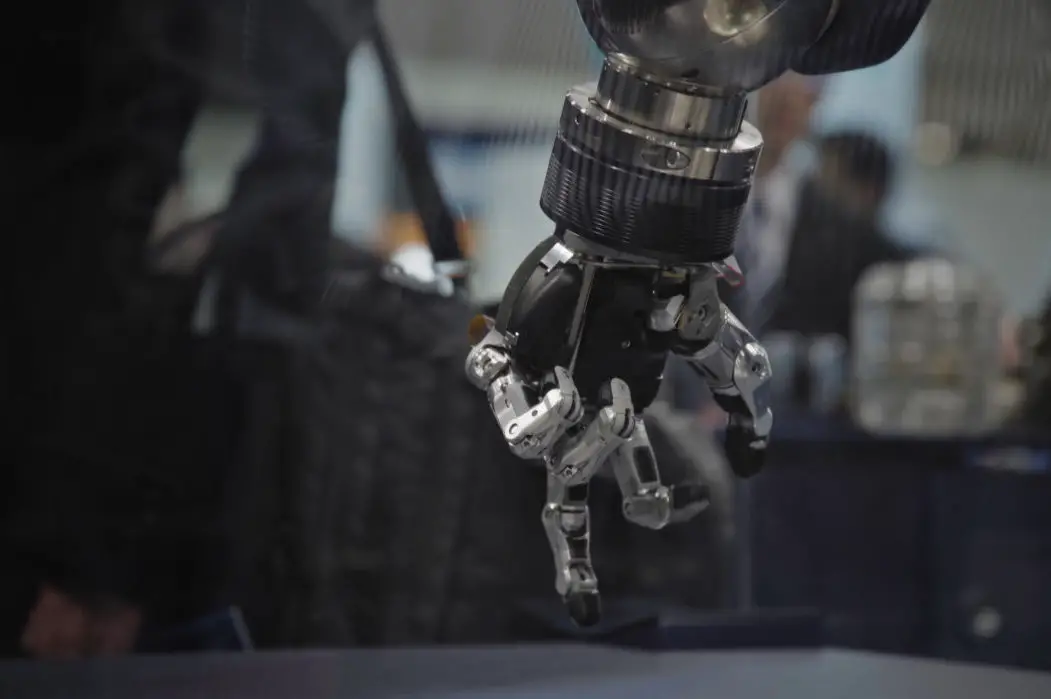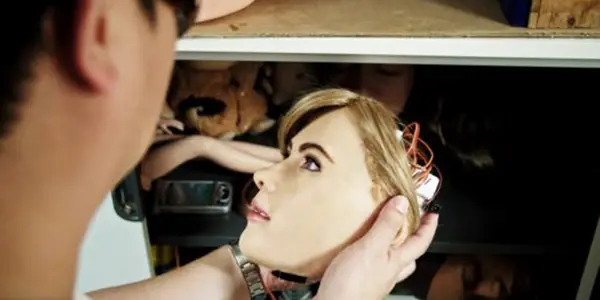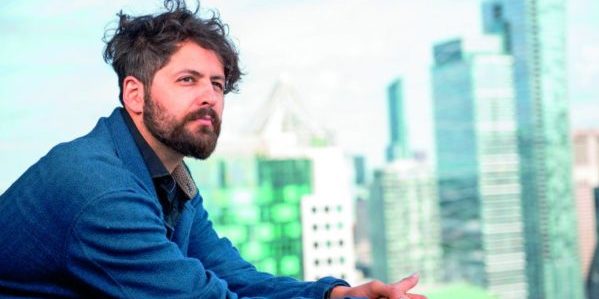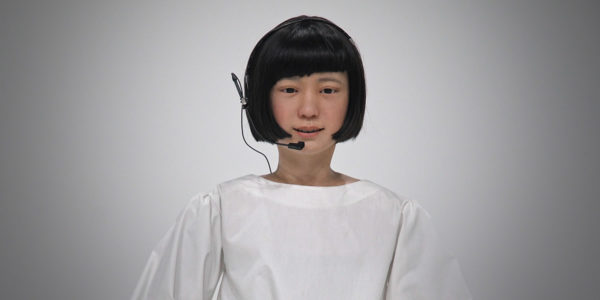No Earnest, Literal Documentaries: Interview With THE TRUTH ABOUT KILLER ROBOTS Director Maxim Pozdorovkin

Matthew Roe is a director, writer, producer, film critic, theorist…
The Truth About Killer Robots is a documentary traipsing how our contemporary global society has become fiercely dependent on robots and automated systems, while also dissecting how these dependencies are perceived through numerous contrasting perspectives from auto workers and engineers, to journalists and philosophers. Robots have caused actual deaths of humans, and director Maxim Pozdorovkin explores how they represent an immediately impending threat to society that may already be on the cusp of becoming our reality.
Pozdorovkin has directed numerous lauded and award-winning documentative projects, including Capital (2010), Pussy Riot: A Punk Prayer (2013), The Notorious Mr. Bout (2014), Clínica de Migrantes (2016), and Our New President (2018).
Matthew Roe for Film Inquiry: Firstly, I want to thank you for setting aside time to speak with me, it’s greatly appreciated.
Maxim Pozdorovkin: My pleasure.
And to kick this off, the most immediate detail to address, for me, of your latest film The Truth About Killer Robots, is that the film is narrated by robots with human faces. I found that this additional play on perspective easily traps audiences in the uncanny valley, so that we are always on edge, even when they are not talking. Was that effect an outright intent, to push a particular tone for the subject matter, or did the narrator’s’ inclusion evolve as the project further developed?
Maxim Pozdorovkin: You know, I think that from the beginning, I’ve thought of this film as sort of science non-fiction. And what that means for me, is that if you think about what science fiction writers did, they looked at the world around them. They picked out the elements that address a future to come, and then created worlds out of those elements. I tried to do something very similar with this film. The narrator of the film is an android, made to narrate the news.
And for us, it also creates this futuristic tone for a film, which is really important. But it also does something in a technological sense because, one thing I noticed in a lot of films, a lot of books, a lot of reporting on the issue of automation, is that they tend to be structured around questions like these: “Can a robot direct a movie?” “Can a robot be a cinematographer?” “Can an AI edit a movie?” And the end is usually “Of course not. These are highly complex human tasks.” And at the end of those movies, we get this false satisfaction of our own uniqueness.
But I am trying to look at the structural economic issues, and if you actually look at the economics of it, the arts are being hollowed out by automation in exactly the same way. It’s all about the industry use. And for me, at the formal level, that means I have to engage with that reality, and use a narrator that is also cheaper than hiring an actor. It’s more pliant and I could endlessly tweak the voice-over of a script and never have to rehire a studio and do everything like that. So it was important to embrace the technology simultaneously, to sort of avoid that fault of how artists are somehow uniquely exempt from what’s happening to all of us.

Exactly, I got some of those vibes. There was an interesting dichotomy going back and forth, with how the interviewees were responding to your questions, buttressed against the narrative aspects of the androids. I also noticed in The Truth About Killer Robots, there is a heavy initial focus on the 2015 Volkswagen auto worker death via a construction robot. Based on the multifaceted comprehension that the opening chapter adopts, was this incident the main inspiration for this film, or was it a culmination of different elements, in which this incident played a particular role?
Maxim Pozdorovkin: The film started with that incident. What happened was, when I went there and met with some of the workers, a lot of them weren’t allowed to talk about the accident. But they were all too glad to talk about the way that automation and robotic technology has transformed being an auto worker. And to me, the whole film is trying to look at these three cases of automation causing literal death as a window onto considering automation as a kind of metaphorical death, a dehumanizing force that has been with us for a long time and is just accelerating now. The other side of that is to not think of artificial intelligence as something we’re just heading towards, and rather to consider it as a continuation of automation that’s already been affecting us – to grapple with it and its consequences more presently.
That is interesting because that goes into my next question. I was wondering, because I have seen the sentiment echoed in many ways in some of the interviews in your film, do you believe that artificial intelligence and automation have advanced for such a long duration of time that we are pretty much past the point of no return when it comes to regulating and controlling these sciences?
Maxim Pozdorovkin: I think that the other malignant consequences of automation will be felt much earlier, much sooner than the existential threats of general intelligence or artificial intelligence. Like the de-skilling of jobs, jobs being stripped of any skill-based dignity, our increasing inability to have emotional connections with other people, and the enfeeblement of memory and spatial orientation. But I think that the rate at which those are happening will transform us significantly, and I think it is worth grappling with those consequences, as well as talking about the high level AI that your question was referring.

One thing that your film brought up in my mind, when I was watching it, is that it centers on many sociological issues that the rise of automation and AI are directly attributed. I know in Chris Paine’s just-released documentary Do You Trust this Computer? where he interviewed Elon Musk –
Maxim Pozdorovkin: Yeah. I’ve seen the film.
Oh, okay. So, he stated that the only way humans won’t be supplanted by AI, is that we have to fully integrate humanity with intelligent machines. Do you believe this approach has some actual viability, or are we sort of flirting with catastrophe?
Maxim Pozdorovkin: You know, my problem with a lot of the films I see about robots and automation, is that they are primarily told in the voices of the CEOs, the engineers, the technology owners, the programmers, the people who are directly benefiting from the technology. And naturally, the only threat that is relevant to them is the kind of threat that you mentioned, and that’s why those solutions seem like reasonable solutions.
But when you look at the entire human race and those concerns, again, the consequences of this technology and the scaling of AI will affect many more people in really profound ways long before any of those questions come up. For me, I was specifically trying to make film in the guise of a sort of sci-fi, dystopian, true-crime thriller and make it a panorama of the labor market; to reveal some of these things that are usually omitted in lots of other films on the subject.
I did take notice of how there was more focus on those who were not the faces of these companies and industries, giving more weight to different sides. Your film did made me think more on the subject than Paine’s film. I’ve had the opportunity to watch two of your previous films, Pussy Riot: A Punk Prayer and Our New President, the latter of which premiered earlier this year, and I have taken note of the similarities in your approach to format and visual aesthetic, though each film remains distinct from one another. The most easily recognizable tropes, I can see being chapter separations in the film’s structure, and distinct frenzied audio/visual montages. I have rarely seen this kind of documentary filmmaking. I find your aesthetic choices, and your blending of themes and subjects rather fascinating. Do you pull these decisions from any particular inspiration, or do you attribute this as the natural evolution of your personal style?
Maxim Pozdorovkin: I think that a lot of times, a lot of the forms the films take, and tone that they take, is a result of a desire to not make earnest, literal films. Films like when you’re seeing a house and you immediately know it’s a poor person’s house or a rich person’s house. And these two films (Our New President, The Truth About Killer Robots) that you’ve mentioned were sort of high concept films, and so I wanted to figure out how do you make a film about disinformation and fake news, so you have to create a form for that. Likewise, with automation, it’s such an important subject, but how do you make a film about it that isn’t just boring.
(laughs) Yes.
Maxim Pozdorovkin: And even this idea of this science-fiction approach. I think each film is very unique stylistically. I’ve also done films like Clínica de Migrantes, which is an HBO film about a clinic who sees undocumented immigrants, and that is just an observational film.

While expanding on my previous question, and your answer, while some documentarians, like Werner Herzog and Ken Burns, have an omnipresent style over their works, I have found that each of your projects possess such striking differences in style and method, that it almost feels as if you reinvent how you make a documentary each time you take on a project.
Maxim Pozdorovkin: That is what’s interesting to me. I just don’t want any of them to remind me of the previous one.
I have a deep respect for filmmakers that keep trying to reinvent themselves each time they take on a project.
Maxim Pozdorovkin: And actually with Herzog, a lot of his early documentaries are very formally inventive. I love his documentaries, he’s a big influence.
Oh yeah, I love Herzog. He has a very specific style now, but I feel that each subject doesn’t require a specific style in order to tell it. That’s why so many different perspectives can be done on the same subject. That leads into my final question. While I am never a fan of asking directors what their films are about, besides the official public synopsis of The Truth About Killer Robots, do you have any particular statement that you want audiences to know, to go along with watching your film, to better absorb your intent?
Maxim Pozdorovkin: Three stories of death by robots, and what they mean.
Very to the point. I appreciate that you have a very no-nonsense approach to your subject matter while being able to play on popular genre sentimentalities to keep the attention to your work constant.
Yeah. I’ve done a lot of genre filmmaking, and I like to think of documentary as genre film. As a way to push away from the literalness and earnestness that I think makes so many documentaries incredibly boring. I am interested in breaking away from that a little bit.
Film Inquiry thanks Maxim Pozdorovkin for taking the time to speak with us.
The Truth About Killer Robots premieres on HBO November 26, 2018.
Does content like this matter to you?
Become a Member and support film journalism. Unlock access to all of Film Inquiry`s great articles. Join a community of like-minded readers who are passionate about cinema - get access to our private members Network, give back to independent filmmakers, and more.
Matthew Roe is a director, writer, producer, film critic, theorist and historian, with over 12 years experience producing film, video, television, and online content. He currently writes DVD/Blu-ray reviews for Under the Radar Magazine, movie reviews for Film Threat, and contributes features to the Anime News Network. He has won two Vollie Television Awards, an Honorable Mention at the LA Movie Awards, and is a Cult Critic Award Finalist. Matthew is a member of the Political Film Society and the Large Association of Movie Blogs.













